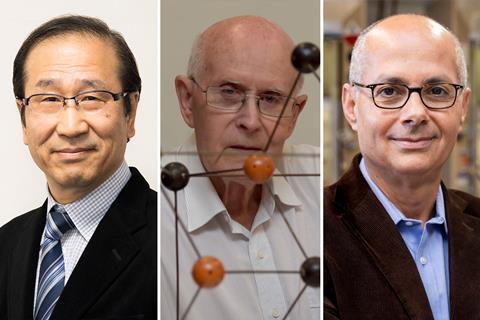The inventors of metal–organic frameworks (MOFs) have received this year’s Nobel Prize in Chemistry. The Nobel committee acknowledged that their contributions in this domain have opened new avenues for chemists to tackle some of the obstacles we encounter, with researchers currently employing them to extract water from arid air, purify water from contaminants, and capture carbon dioxide.
The 2025 Nobel Prize in Chemistry was awarded equally to Susumu Kitagawa from Kyoto University in Japan, Richard Robson from the University of Melbourne in Australia, and Omar Yaghi from the University of California, Berkeley in the US for their advancements in metal–organic frameworks.
Robson was the first to speculate on the creation of these frameworks back in the 1980s. Influenced by diamonds, he crafted a similar configuration utilizing positively charged copper ions paired with an organic linker featuring nitrile-end groups drawn to the copper ions. This led to a substantial molecular architecture with cavities, differing from diamonds. However, many early designs proved to be unstable despite their promise.
In the 1990s, Kitagawa made a significant advancement by employing cobalt, nickel, or zinc ions along with 4,4′-bipyridine to forge 3D MOFs that had stable, open channels capable of reversibly adsorbing gases. His 1998 publication illustrated their potential for developing soft, flexible materials responsive to environmental variations.
Yaghi, in the US, published in 1995 the configuration of stable 2D materials that could accommodate guest molecules. He introduced the term ‘metal–organic framework’ and further propelled the discipline with MOF-5 in 1999, creating a robust structure with expansive surface areas. Yaghi showcased the adaptability of MOFs in 2002 and 2003 by modifying them to change their characteristics and create numerous variations.
The foundational breakthroughs achieved by these pioneers have resulted in the creation of various functional MOFs, with growing interest and investment towards their fabrication and possible applications.
Olof Ramstrom, a member of the Royal Swedish Academy of Sciences, highlighted the continuous evolution and utilization of MOFs for the betterment of humanity. Kitagawa conveyed his honor and happiness regarding the accolade, while Annette Doherty from the Royal Society of Chemistry commended the awarded researchers for their groundbreaking contributions to chemistry, stressing the tremendous application potential of their work in enhancing the world.
